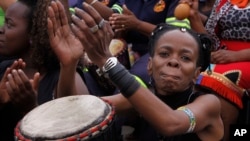Monday, November 25, is International Day for the Elimination of Violence against Women. The U.N. says gender-based violence is a serious violation of human rights and increases the risk of HIV infection.
The Joint United Nations Program on HIV/AIDS – UNAIDS – says every hour 50 young women become newly infected with HIV. Many of those infections are related to violence.
“Lots of the gender-based violence [is] sexually related. There is a lot of data right now showing that most of the violence against women happens in the context of intimate partner violence – domestic violence. And many times it takes the face of non-consensual sex, which is a polite way to say rape,” said Dr. Mariangela Simao is UNAIDS Director of Rights, Gender, Prevention and Mobilization.
Simao said gender-based violence is strongly linked to HIV/AIDS.
“In some countries where there’s a high prevalence, it’s been shown that women who are subjected to intimate partner violence, sexual violence, are 50 percent more likely to be HIV positive than other women. The gender inequality, the gender disparity also, [do not] allow women to negotiate, for example, for safe sex. If, for example, they think that their partner’s been fooling around or being unfaithful in different situations, they [cannot] ask for him to use a condom.”
Many sexworkers are also frequent victims of violence and are unable to have safe sex.
“There’s a recent report from WHO [World Health organization] that shows that one in every three women – that’s a global report, ok – experience physical or sexual violence by a partner in their lifetime. One out of three women. So it’s not a localized problem in developing countries or least developing countries. It’s a global problem,” she said.
The World Health Organization report also said up to 45-percent of adolescent girls globally say their first sexual experience was forced. Violence against women includes coerced abortion and forced sterilization.
The UNAIDS official said that many times sexual or gender-based violence happens under the guise of culture or tradition.
“The right of women to live free of violence and inequities is a human right. And it shouldn’t be bound by culture and by norms that rule society that are unjust.”
She said empowering women would help end the violence. That begins with girls through education and an awareness of their rights. But she also says men must play a big role in solving the problem.
That’s the other aspect because this is not a feminist battle. We should be fighting for social justice for a better society. And gender equality is paramount for a better society.
Dr. Simao joined UNAIDS in 2010. She is the former Director of Brazil’s Department of Sexually Transmitted Diseases and AIDS.
The Joint United Nations Program on HIV/AIDS – UNAIDS – says every hour 50 young women become newly infected with HIV. Many of those infections are related to violence.
“Lots of the gender-based violence [is] sexually related. There is a lot of data right now showing that most of the violence against women happens in the context of intimate partner violence – domestic violence. And many times it takes the face of non-consensual sex, which is a polite way to say rape,” said Dr. Mariangela Simao is UNAIDS Director of Rights, Gender, Prevention and Mobilization.
Simao said gender-based violence is strongly linked to HIV/AIDS.
“In some countries where there’s a high prevalence, it’s been shown that women who are subjected to intimate partner violence, sexual violence, are 50 percent more likely to be HIV positive than other women. The gender inequality, the gender disparity also, [do not] allow women to negotiate, for example, for safe sex. If, for example, they think that their partner’s been fooling around or being unfaithful in different situations, they [cannot] ask for him to use a condom.”
Many sexworkers are also frequent victims of violence and are unable to have safe sex.
“There’s a recent report from WHO [World Health organization] that shows that one in every three women – that’s a global report, ok – experience physical or sexual violence by a partner in their lifetime. One out of three women. So it’s not a localized problem in developing countries or least developing countries. It’s a global problem,” she said.
The World Health Organization report also said up to 45-percent of adolescent girls globally say their first sexual experience was forced. Violence against women includes coerced abortion and forced sterilization.
The UNAIDS official said that many times sexual or gender-based violence happens under the guise of culture or tradition.
“The right of women to live free of violence and inequities is a human right. And it shouldn’t be bound by culture and by norms that rule society that are unjust.”
She said empowering women would help end the violence. That begins with girls through education and an awareness of their rights. But she also says men must play a big role in solving the problem.
That’s the other aspect because this is not a feminist battle. We should be fighting for social justice for a better society. And gender equality is paramount for a better society.
Dr. Simao joined UNAIDS in 2010. She is the former Director of Brazil’s Department of Sexually Transmitted Diseases and AIDS.





